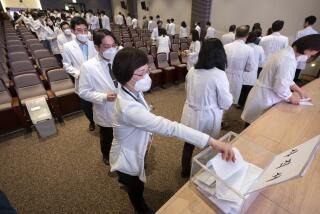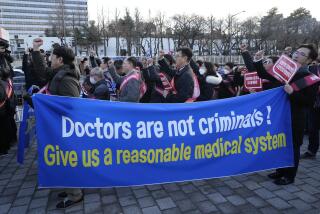Curbs Urged on Interns’ Workweek
- Share via
A coalition of consumers, medical students and physician groups--as well as an expert in sleep disorders--petitioned the federal government Monday to limit the workweek of doctors in training to 80 hours per week.
Many doctors employed as hospital residents work schedules of 95 hours a week or more, studies show. Their pace is so grueling, the petitioners said, that it increases risks that exhausted young doctors will inadvertently harm patients. It also raises the risk that the doctors, who are undergoing postgraduate training, will become involved in car crashes, suffer depression and give birth to unhealthy or premature babies, according to the petition.
The petition was filed with the federal Occupational Safety and Health Administration by the consumer group Public Citizen, a union called the Committee of Interns and Residents--which represents 11,000 residents--and by the 30,000-member American Medical Student Assn.
The groups were joined by two professors of medicine, sleep disorder specialist Dr. Kingman P. Strohl of Case Western Reserve University, and Dr. Bertrand Bell of Albert Einstein College of Medicine.
Bell presided over a New York state commission appointed a decade ago after an exhausted resident made a medication mistake that resulted in the death of an 18-year-old woman.
New York’s Legislature responded by making New York state the first--and still the only--state to limit residents to an 80-hour week.
But the petition cited evidence that even this limit is ignored. A surprise inspection of a dozen New York hospitals in 1998 found that almost all residents in the New York City hospitals inspected, and more than a third who worked in hospitals elsewhere, labored longer than the law allowed.
Residents at public hospitals in Los Angeles told of similar woes. “We have residents who work between 80 and 120 hours per week at all three county hospitals,” said Dr. Angela Nossett, a family medicine resident at Harbor-UCLA Medical Center who is president of the Committee of Interns and Residents’ Los Angeles affiliate. She said residents at private hospitals work similar hours.
Long hours for residents is a tradition in medicine, with proponents arguing that it leads to greater continuity in patient care and toughens those being trained.
But in recent years researchers have questioned the wisdom of forcing young people to endure this type of hardship.
In a letter to the editor of the Journal of the American Medical Assn. cited by the petitioners, Dr. Murad Alam of Columbia University’s College of Physicians and Surgeons wrote: “On-call responsibilities make residents exhausted, lonely and unable to meet their own needs.”
Researchers at Wayne State University in Detroit found that residents were much more likely to crash their cars than they were before they became residents. Researchers at Johns Hopkins University were told by half of the residents they surveyed that they had fallen asleep at the wheel.
Last year, four residents in internal medicine at Los Angeles County-USC Medical Center were involved in separate car crashes. In each case, they had worked on-call at the hospital for 24 hours, spent several more hours doing paperwork and then been dispatched to see patients at a county clinic, said Dr. Scott Selco, a resident at the hospital and president of its interns and residents union chapter. Coming home from the clinic in the evening, they collided with other vehicles, resulting in minor injuries, he said.
After the accidents, Selco said, the hospital agreed to comply with a contract provision, approved by the Board of Supervisors, barring internal medicine residents from being required to see clinic patients after they have been on call for 24 hours. Other departments at the hospital, however, remain in flagrant violation on this contract provision, Selco said.
John Wallace, a spokesman for the county Department of Health Services, which oversees the hospital, would say only that the department is studying residents’ working conditions at the direction of the Board of Supervisors.
“We’re cheap labor,” said Dr. Jasmine Eugenio, a postgraduate fellow in pediatrics at Martin Luther King Jr./Drew Medical Center and executive vice president of the national Committee on Interns and Residents.
She said the county pays most residents $31,000 to $40,000 per year.
Eugenio said that she could relate to another of the research findings cited by the petitioners--that women residents were more likely to suffer complications with their pregnancies.
“During my first three years of residency, I lost a baby each year,” she said. “During my second year, two of my colleagues lost babies in the same month I did. I don’t think I can attribute this to chance alone. I ended up adopting.”
More to Read
Sign up for Essential California
The most important California stories and recommendations in your inbox every morning.
You may occasionally receive promotional content from the Los Angeles Times.













